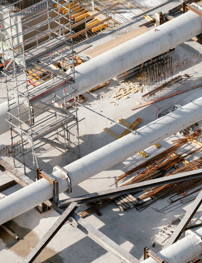The Role of a Quantity Surveyor / Cost Manager:
Known in the industry as a Construction Cost Consultant or Cost Manager, our role is to keep a close eye on all project finances and contractual relationships between the client and the contractors appointed.
We make sure that the financial position of construction projects is accurately reported and controlled effectively. We also manage all the contractual relationships (procurement) between the various parties involved in ongoing building projects.
The Professional Services a Quantity Surveyor provides:
PRELIMINARY
COST ADVICE
COST ADVICE
Preliminary Cost Advice can be given by the Quantity Surveyor at the very outset of a scheme, even before drawings are prepared. At this stage of the project, such advice may indicate the probable region of cost of the proposed project, or may consist of an assessment of what type and structure may be erected for any given expenditure. With this information, the QS can assist his client In the preparation of a budget for the project.
Once preliminary drawings have been prepared the QS can prepare a more detailed approximate estimate taking into account the many factors which influence cost, e.g:
- Location and nature of site and availability of service mains,
- Shape. Height and specification,
- Use of industrialized components and methods
- Market conditions at the time of preparing the estimate,

Probable variations in cost due to fluctuating conditions between the time of the estimate and the likely date of tender.
This cost advice enables design decisions to be made with full knowledge of their financial implication to the Client.
Early cost information of this nature often enables a Client to make other financial decisions which he would otherwise have to delay.

COST PLANNING
Every Client will want to ensure that he obtains value for money. Value for money not only in respect of the capital cost but also In respect of running and maintenance costs. This is appreciated by the Quantity Surveyor and he has evolved a technique known as “cost planning” which enables his cost advice to be used objectively during the design process on every aspect of the structure.
Cost Planning involves a systematic analysis of the proposed building which enables the cost of each constituent element to be valued against its performance requirements and aesthetic considerations.
To prepare a Cost Plan, the QS analyses the preliminary estimate allocating costs to various functional parts, or elements of the building.
Alternative designs can then be prepared by the Architect or Engineer and these in turn are costed. The Client is then offered a number of alternatives or his building requirements, each with its financial and design implications clearly known at the outset.
The important aspect is: the owner and developer will have an understanding of how the cost of the building is spread throughout the project.
When the detailed drawings have been prepared the Architect and Engineers, the QS will prepare the Tender Documents, and will use the Cost Plan to check progress as the project progresses.
PREPARATION OF
TENDER DOCUMENTS
TENDER DOCUMENTS
The most common forms of contract for construction works are based on the use of Bills of Quantities as contract documents.
Bills of Quantities are the translation of the designer’s drawings and specification into words and quantities. Essential in the procurement process, as they enable each Contractor tendering to estimate his price exactly on the same basis as his competitor, apple to apple. The Bills of Quantities for building contracts are prepared in accordance with an established Standard Method of Measurement.
This means they are recognized and accepted by all concerned with construction work and they provide a tendering basis which is fair and equitable to both parties to a building or engineering contract.
The Bills of Quantities are later used during the construction of a project to provide a basis for the financial management of the contract.

In certain circumstances, particularly where time is an important factor in the proposed development, or where work must commence before designs are completed, Bills of Approximate Quantities can be prepared. These will incorporate all necessary financial safeguards to the client and provide a satisfactory basis for valuing the work as finally carried out.

CONTRACT ADVICE
Works of building and civil engineering construction may be carried out under various contractual conditions, the choice of the appropriate contract depends on the nature of the project, the circumstances under which it is carried out and the particular needs of the client.
On the whole it is advantageous to use standard forms of contract which are recognized throughout the industry and have been drafted in the light of the experience, this ensures that the rights and obligations of the parties to the contract, and the duties of professional advisers are clearly defined.
Through experience overtime the Quantity Surveyor, in conjunction with the Architect or Engineer, is able to advise his Client on the right form of contract for the project.
ADVICE ON
OBTAINING TENDERS
OBTAINING TENDERS
Tenders for construction work may be obtained either in competition or by negotiation. The choice of the most suitable procedure according to the circumstances is one of the more important decisions to be taken at an early stage, and is one of the matters on which the Quantity Surveyor’s advice is most valuable.
Competitive tendering based on selected firms of contractors being invited to submit tenders on Bills of Quantities is still the most widely favored procedure.
The Quantity Surveyor can offer advice on the selection of suitable companies to join the Tender, according to the type and size of a project and the general standard of workmanship and skill that is required.
When the Tenders have been obtained the QS will check and clarify the bids in order that no substantial errors have been made, thus ensuring that the contract is not entered into on the basis of an incorrect estimate which may later prove to be against the interest of both Client and Contractor.

The advice which the Quantity Surveyor can give in selection of Contractors and obtaining Tenders can also be applied to the choice of Specialist Contractors and Suppliers and obtaining of quotations or tenders from them.

VALUATIONS
OF
WORK IN PROGRESS
OF
WORK IN PROGRESS
Under most forms of building or engineering contract the Contractor is paid each month for the work which has been done the preceding month.
It is the Quantity Surveyor’s duty to value the work carried out during the period in question, together with the value of any variations which may have been authorized, and to submit to the Architect or Engineer a recommendation regarding a payment on account. If he is satisfied that the work involved has been carried out in accordance with the terms of the contract, the Architect or Engineer will then certify the amount due to the contractor, in accordance with the Quantity Surveyor’s valuation.
MEASUREMENT
OF
VARIATIONS
OF
VARIATIONS
During construction variations in the work are frequently necessary sometimes to take account of the Client’s changing needs, sometimes to overcome site conditions which could not be forseen, such as the presence of underground obstructions.
The Quantity Surveyor values the variations and reports their impact on the probable final cost so that corrective steps may be taken elsewhere in the work, if the Client requires, so that overall expenditure remains within the authorized cost limit.


COST CONTROL AND
PREPARATION OF
FINANCIAL STATEMENTS
PREPARATION OF
FINANCIAL STATEMENTS
Where a full cost plan has been prepared in the design stages the Quantity Surveyor will revise his cost plan in the light of the accepted tender and use it as a basis for cost control during the construction process.
As part of this systematic control of the cost during the progress of the work the Quantity Surveyor will prepare at regular intervals financial statements which keep the client and the design consultants fully informed of the up-to-date financial position and the anticipated final cost of the project.
PREPARATION
OF
THE FINAL ACCOUNT
OF
THE FINAL ACCOUNT
The Quantity Surveyor’s duties end with the calculation of the final cost. This is achieved by preparing a final account for the work in which the contract sum is adjusted in accordance with the terms of the contract to take account of any variations, of adjustments in the accounts of nominated Sub-Contractors and Suppliers and of any other matters which the contract provides shall be the subject of financial adjustment.
This final account is agreed with the Contractor and provides a fair and equitable settlement of the cost in accordance with the contract conditions.
The Quantity Surveyor will also prepare any analysis of the final account which the Client may require.



